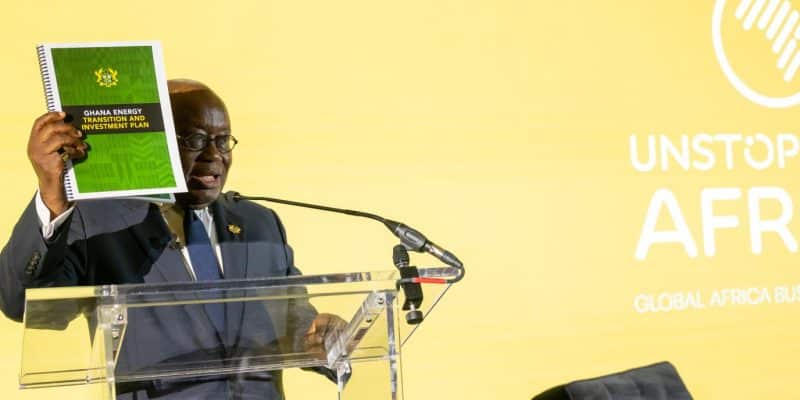The government of Ghana is launching a $550 billion investment plan for the energy transition. The targeted sectors include electricity and mobility.
At a time when Ghana has been plunged into an economic crisis since part of its debt was suspended at the end of 2022, President Nana Addo Dankwa Akufo-Addo has announced an investment plan to promote energy transition. The plan was presented to the international community at the Global Africa Business Initiative, an event organised on the sidelines of the 78th General Assembly of the United Nations (UN) in New York, USA.
With this plan, Ghana aims to be carbon neutral by 2060. Under the previous plan, the West African country was aiming for zero net emissions by 2070. For the international organisation Sustainable Energy for All (SE4All), this new plan shows that “Ghana has revised its ambitions upwards”. Over the next few years, Accra intends to mobilise 550 billion dollars with the support of the international community to deploy low-carbon solutions in the key sectors of its economy, notably oil and gas, industry, transport, cooking and electricity.
Decarbonising transport
Ghana currently has an installed electrical capacity of 5,300 MW, of which more than 3,000 MW comes from fossil sources, notably gas and oil, according to Power Africa. In terms of clean cooking, there is still a long way to go, with 70% of the population still cooking over wood fires and other polluting solutions, according to the World Bank.
“This plan demonstrates our determination to encourage green industries, promote the development of cutting-edge low-carbon technologies and propel our country towards a sustainable industrial revolution, while providing equal growth opportunities for men and women”, explained President Nana Addo Dankwa Akufo-Addo.
Read also- GHANA: the CIF grants $28m for electrification via solar mini-grids
The funding mobilised will enable the distribution of environmentally-friendly stoves, renewable energies, low-carbon hydrogen and electric mobility. According to estimates by the Ghanaian government, these sectors should account for 90% of the targeted reduction in emissions between now and 2060. Over the same period, at least 400,000 jobs could be created in sectors linked to the energy transition.
On the other hand, if this plan is not implemented, “in a business-as-usual scenario, Ghana’s emissions are expected to rise from 28 million tonnes of CO2 equivalent in 2021 to more than 140 million tonnes in 2050, with most of the growth in emissions coming from transport, driven by population growth, the increase in gross domestic product (GDP) per capita and vehicle ownership”, warns the SE4All organisation, which is working to implement the 7th Sustainable Development Goal (SDG), which aims to achieve universal access to renewable energy by 2030. The road to energy transition has therefore been mapped out in Ghana. It is now up to the financial partners and professionals in the energy sector to do the rest…
Jean Marie Takouleu





